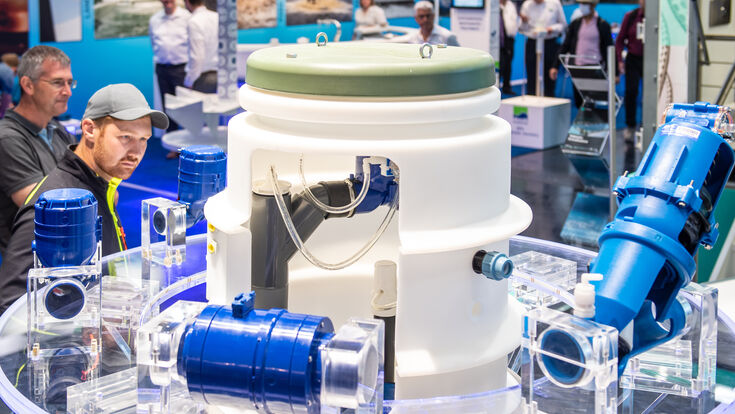IFAT : Municipalities: core target group for the environmental industry

From 13 to 17 May 2024, IFAT Munich will once again bring the world's environmental technology industry together in one place. Exhibitors at the New Munich Trade Fair Centre will once again be presenting their latest products, processes and services in the fields of water, waste water, waste and raw materials management to a trade audience. For many of them, cities and municipalities, with their wide range of environmentally relevant tasks, are part of their key customer base. Municipalities, for example, face the constant challenge of ensuring the quantity and quality of drinking water supplies, maintaining infrastructure assets and averting potential risks to society and the environment - all at reasonable cost. With this in mind, the German Technical and Scientific Association for Gas and Water (DVGW) is offering three solution tours at the world's leading trade fair in Munich: "Innovative technologies for assessing the condition of underground pipelines", "Protection of critical infrastructure in drinking water supply" and "Increased water temperature in the distribution network". At the Association's stand, keynote speeches will explain the problem at hand, before guided tours take participants to exhibitor solutions.
New PFAS limit values affect treatment requirements
The revised Drinking Water Ordinance came into force in Germany in June 2023. It implements key elements of the EU Drinking Water Directive from 2020. Among the new and amended limit values, the toxicologically relevant per- and polyfluoroalkyl substances (PFAS) clearly play the most important role. Water suppliers may have to filter out PFAS at considerable technical expense. “However, end-of-pipe approaches are not a solution. The production and use of PFAS must be limited to a few essential purposes. The aim must be to already avoid these substances at the pollution source. These substances must not be released into the environment in the first place,” says Wolf Merkel, DVGW Board Member for Water. The association is taking this as an opportunity to present new technological approaches to the treatment of water containing PFAS at IFAT Munich as part of its “TechLIFT” event format, and to discuss them with a panel of experts.
“The list of challenges facing local authorities in the wastewater sector is also long,” as Dr. Friedrich Hetzel stresses. As examples, the head of the Water and Waste Management Department at the German Association for Water, Wastewater and Waste (DWA) cites the separation of phosphorus from wastewater and sewage sludge, the lower limit values for nutrients such as phosphorus in the effluent of wastewater treatment plants expected as a result of the amendment to the EU Urban Wastewater Directive, the removal of trace substances from the water cycle, and combined sewer overflows.
For a water-conscious, resilient municipality
He also believes that water-conscious urban development should be high on the municipal agenda, driven by the consequences of climate change. "A central aspect here is the intelligent handling of rainwater, especially in the context of extreme events. What is needed are solutions that help deal with their consequences or minimize them in advance through appropriate technical measures,” says Hetzel. Specifically for the public sector, the DWA, in collaboration with the DVGW and the German Association of Local Utilities (VKU), is offering the Day of Resilient Municipalities on Thursday, May 16, as well as various solution tours at IFAT Munich.
Digitalization and protection of critical infrastructure
Like society as a whole, cities and municipalities are of course also called upon to address the opportunities and risks of the digitalisation megatrend. The VKU, for example, is organising a panel discussion on the forum stage entitled “AI: Detection systems and reusable materials scanners—how much AI does the waste industry need?” It will examine the question of whether AI is really suitable for minimizing resource consumption and improving the quality of the individual categories of waste collected in the interests of a functioning circular economy.
The public utility and waste disposal industry is also a critical infrastructure (KRITIS). “The physical and virtual threat has been growing here for years. It is essential to protect these services,” emphasizes VKU Vice President Patrick Hasenkamp. On the forum stage, the association will show which legal obligations KRITIS operators must already fulfill now and, more importantly, in the future.
The VKU solution tour “Waste Logistics 2035” also takes a looks into the future. “Waste logistics will play a decisive role in resource management by minimizing waste, preserving valuable resources, and hence reducing the environmental impact,” Hasenkamp is convinced. After a presentation, the trade fair visitors will be guided to selected VKU member companies, where they will learn more about current developments.
Clean drives for municipal vehicles
“When it comes to municipal vehicles and equipment, the use of alternative drive systems, especially hydrogen and battery solutions, and the development of the required charging infrastructure are still key issues,” says Burkard Oppmann, President of the German Municipal Vehicles and Equipment Industry Association (VAK). The VAK will, for the first time, be holding a 45-minute panel discussion with industry experts on these and other topics on each day of IFAT Munich 2024. The discussion will deal, among other things, with an emission-free municipal vehicle industry and municipal economy, the promotion of CO2-free waste disposal, and professional driver qualifications.
The future topic of hydrogen
What role can hydrogen play in the municipal environmental services sector? A Spotlight Area is dedicated to this question. According to the organisers, DVGW and Zentrum Wasserstoff.Bayern (H2.B), it will show that there are interesting starting points in both the production and use of the climate-friendly energy source and its by-products. For example, the energy produced in waste incineration and biogas plants can be used for carbon-neutral hydrogen production. In addition to hydrogen, electrolysis of water also produces oxygen, which can be used to effectively aerate settling tanks. Methane from sewage sludge treatment or plastic waste can be converted into hydrogen and carbon, which can be used in agriculture or industry. And as mentioned above, the first waste collection vehicles are already running on hydrogen.
